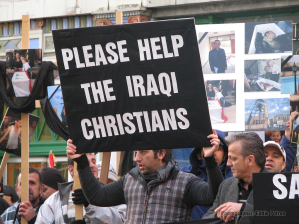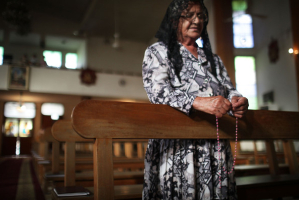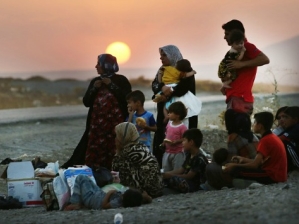
Christians and other minorities in the Middle East have faced persecution for centuries in the region. However, the latest round of persecution has left some Americans wondering how their country can help those people.
According to an opinion article written by Brian Katulis, Rudy Deleon, and John B. Craig of Newsweek, there are between 7.5 million and 15 million Christians in the Middle East, many of them living in Egypt, Syria and Lebanon. They noted that thanks to systematic discrimination and brutal atrocities committed by ISIS, some of the oldest Christian communities in the world are disappearing from the map.
"These incidents underscore the gravity of the situation," Katulis, Deleon and Craig wrote. "As a consequence, Christians have migrated from the region in increasing numbers, which is part of a longer-term exodus related to violence, persecution and lack of economic opportunities stretching back decades. They have also moved to safe havens within the Middle East."
Newsweek reported that the safe havens where displaced Christians go included Jordan, Iraq (mainly the area controlled by the Kurds) and Lebanon. Even though the amount of Christians have increased in the region since the 20th century, they only represent less than 5 percent of the Middle East's population thanks to migration patterns and the huge rise in non-Christian populations.
"The current wave of extremism, civil wars and a complicated mix of state collapse in some places combined with the re-emergence of authoritarianism are leading to a new wave of victims," Katulis, Deleon and Craig wrote. "The ongoing decline is such that many Christians in the Middle East today fear that their churches will turn into museums rather than places of worship serving vibrant communities of believers."


Newsweek reported that in some countries, such as Egypt and Lebanon, Christians there are offered "a stronger sense of protection and security." Katulis, Deleon and Craig elaborated in their report, which is published in full on the Center for American Progress website, on why it was important for the United States to focus on the status of Christians in the region.
"The status of Christians in the Middle East is an important leading indicator of the type of region that is emerging," Katulis, Deleon and Craig wrote. "Christians have historically acted as a bridge connecting East and West."
Katulis, Deleon and Craig argued that the future of pluralism in the Middle East depends on how Christians are treated in that part of the world. Based on the trends they found, its fate looked grim.
"This is important at a time when the United States and other countries continue to wrestle with the question of how to most effectively counter violent extremism and to politically defeat terrorist networks and radical ideologies that undermine the overall stability and prosperity of the region," Katulis, Deleon and Craig wrote.
The United States has outlined a few strategies to engage on this topic. However, the reporters acknowledged that some "unforced errors" have contributed to blowback against Middle Eastern Christians.
"For example, the 2003 Iraq War and its aftermath had devastating consequences for the Christian community there," Katulis, Deleon and Craig wrote. "Some of it is the consequence of flawed engagement strategies."
The reporters admitted that Christians "are caught up in the broader regional struggles," which also included "broader geopolitical tensions between Russia and the United States." They came up with several suggestions that the U.S. could do to address the plight of Christians.
"Prioritize assistance to refugees and displaced persons with specific responses for Christian refugees," Katulis, Deleon and Craig wrote. "Make use of U.S. strategic communications to promote religious freedom, pluralism and inclusivity as a priority. Use U.S. military force and security assistance cautiously and beware of potential pitfalls."
Katulis, Deleon and Craig added that whatever strategy is pursued by the United States, it "will only be successful if the issue is approached with great sensitivity and care to the broader landscape of change in the region."






